
DMZ Tour Hue – Our Review
TL;DR
Our review of the Vietnam DMZ tour we did in Hue.
On our recent trip to Vietnam, we wondered how to see the DMZ from Hue. We opted for a guided tour and can confidently say that this is the best way to see the Vietnam DMZ. The distances are far so driving on your own will be very tiring. Additionally, a knowledgeable guide helps you to understand the complicated conflict and can point out details you would have missed on your own.
DMZ Tour from Hue
We opted for the Deluxe group tour full day and we can 100% recommend it.
DMZ Tour Vietnam Itinerary
Our tour guide picked us up from our hotel in Hue at 7:30 am.
- The location is super central
- The owner is amazing and will organise everything from bikes to tours
- The free breakfast is delicious
- There is FREE BEER every evening
1. Long Hung Church
Our first short stop was Long Hung Church. The Catholic church was built in 1955. Nowadays, it’s a memorial of the Second Battle of Quang Tri.
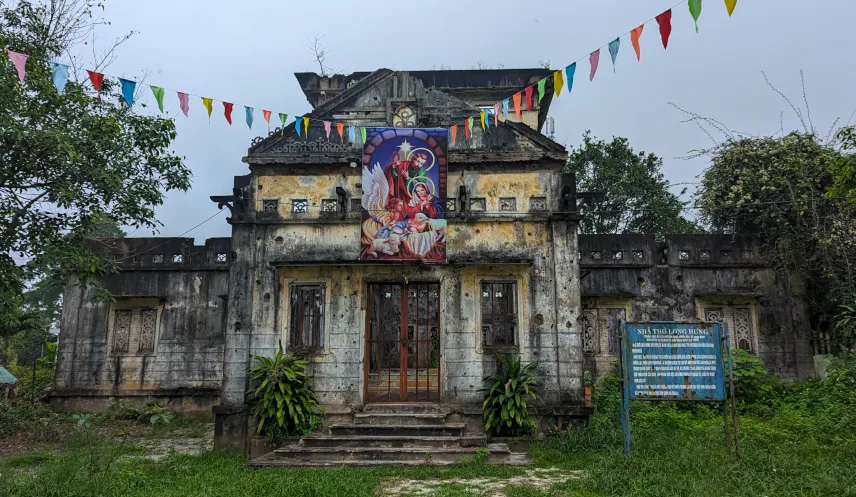
2. Quang Tri Ancient Citadel + Museum
This is the first long stop of the tour. Quang Tri Ancient Citadel was constructed as a 19th-century fort. Nowadays, it’s famous as the site of the Second Battle of Quang Tri.
The Second Battle of Quang Tri took place in 1972 and lasted 81 days. South Vietnam's Army defeated the North Vietnamese Army and recaptured most of Quang Trị Province during this battle.
Tourists can visit the grounds as well as a small museum. On the day of our visit, there was a ceremony to commemorate the battle, which was interesting to observe.

3. Dakrong Bridge
Dakrong Bridge is another quick stop. It was an important part of the Ho Chi Minh trail network. The old iron bridge from 1975 collapsed and was rebuilt in 2000.
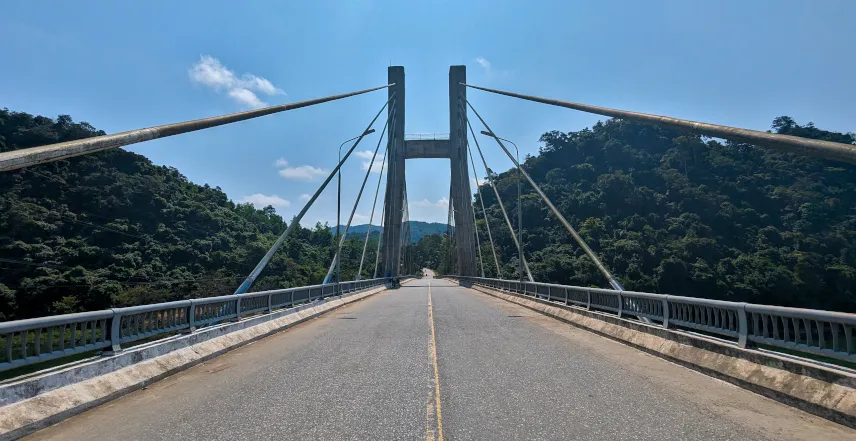
4. Khe Sanh Combat Base + Museum
Khe Sanh Combat Base is the second long stop of the Hue DMZ tour. Khe Sanh Combat Base was a United States Marine Corps outpost south of the Vietnamese Demilitarized Zone (DMZ) used during the Vietnam War.
US Army Special Forces constructed the camp and airfield in 1962 to watch North Vietnam’s infiltration along the border and to protect the local population. After 170 days and nights of fierce fighting, the US Marines withdrew from Khe Sanh Base in 1968.
Nowadays, you can see loads of discarded military equipment like tanks, helicopters, and airplanes. Additionally, you can enter the trenches and learn more about the battle in a small museum.
Controversially, there is a small cafe on the premises where you can try locally grown coffee.
This is also where we had our lunch stop, which was not really remarkable, to be honest.

5. Hien Luong Bridge
Hien Luong Bridge is located exactly at the 17th parallel and hence was split in two between South Vietnam and North Vietnam from 1954 to 1976.
Situated on the military border during the war, it became a symbolic battleground where both South Vietnam and North Vietnam engaged in propaganda conflicts. Massive speakers were deployed by both sides, blasting their messages across long distances. Additionally, whenever the South Vietnamese repainted their section of the bridge, the North Vietnamese would paint theirs in the same colour, symbolising their desire for a unified Vietnam.
In a competition of size and height, both sides erected towering flag poles, with the North eventually claiming victory with a 38.6-meter pole. The South attempted to destroy the opposing flag. In 1967, the bridge and the North Vietnamese flag pole were destroyed by bombing. In response, North Vietnam consistently rebuilt a new flag pole each time the old one was destroyed. There were even sewing machines sent to the frontline.
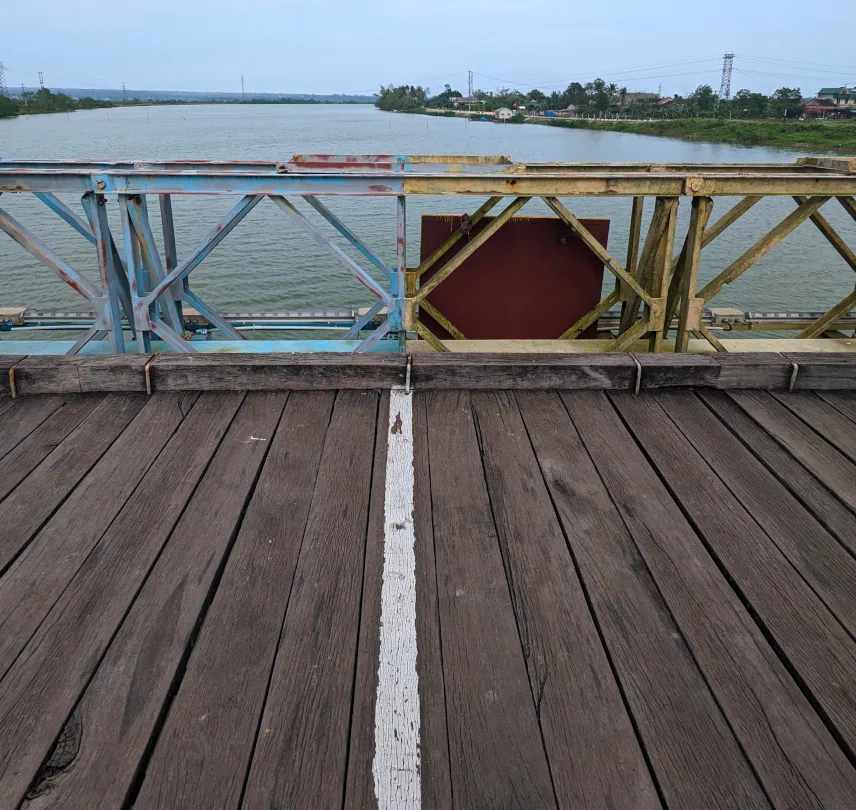
6. Vinh Moc Tunnels + Museum
Different from the Cu Chi tunnels in Southern Vietnam, which were constructed for military campaigns, the Vinh Moc tunnels were built as living quarters for the population. Hence they are much more comfortable to walk through.
The tunnels were built to shelter people from the intense bombing. Construction began in 1965 and finished in 1967 with simple tools in 18,000 labour days. The total size of the tunnels is nearly 2,000 m long and 30 meters deep, with six entrances to the tops of hills and seven entrances to the sea.
The complex comprised wells, kitchens, individual rooms for each family, and healthcare facilities. Approximately sixty families resided within the tunnels, and as many as 17 children were born inside them. The tunnels proved to be a success, with no casualties among the villagers. The only instance of direct impact occurred when a bomb failed to detonate, creating a hole that was repurposed as a ventilation shaft.
Nowadays, you can not only visit the tunnels nut there’s also a small museum on the premises.
We were back in the hotel after 6 pm.
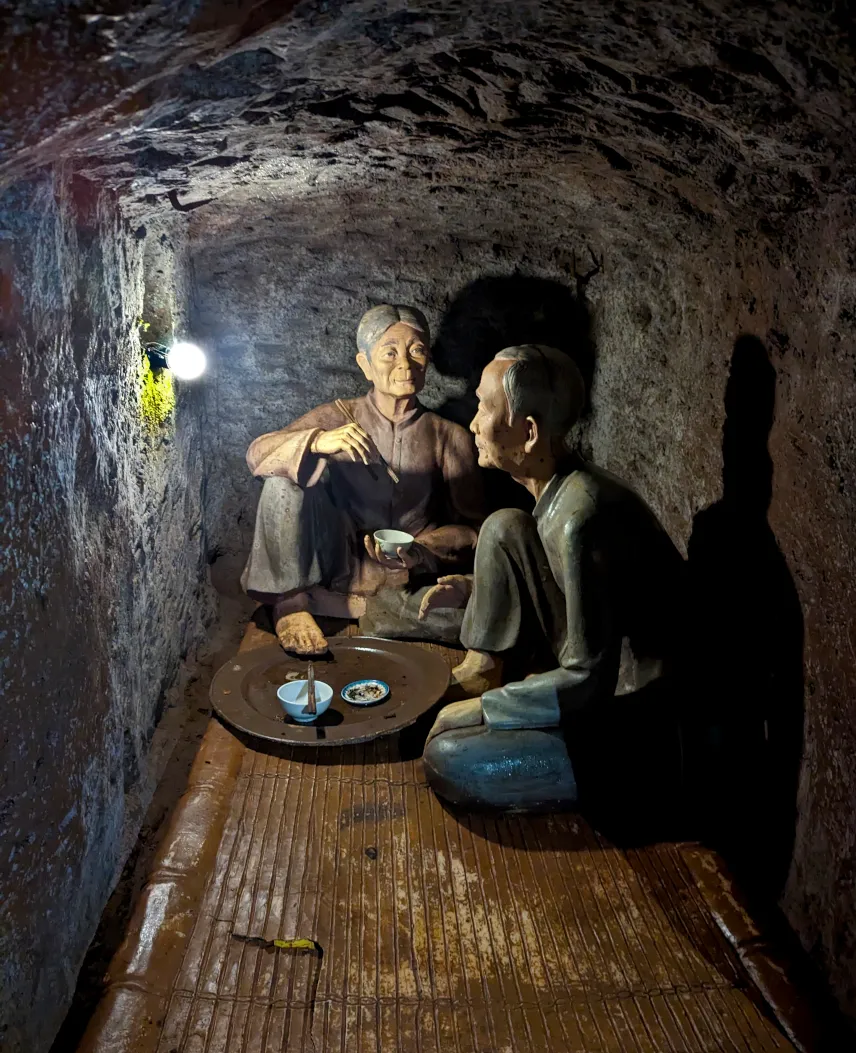
Hue DMZ Tour – Our Review
We loved everything about this tour! The organisation was great and our guide was very friendly and knowledgeable. We were provided with every information necessary: From the broad historical overview to the details of the individual sights.
We had enough time at every stop and all stops complemented each other really well to get a full picture of the conflict.
We were shocked at how few other tourists we encountered. In fact, our group were the only people at Khe Sanh Combat Base! (This was such a stark difference to other tours we did in Vietnam like the Mekong Delta tour.)
What Other Travellers Say About the Hue DMZ Tour
⭐ Rating: 4.8 / 5 (227 reviews)
A must do in Hue!
Α very educational and exciting tour, a little off the beaten since most people visit the Cu Chi Tunnels but not the Vinh Moc. The guide (I think his name is spelled Nhoc) is very knowledgeable, also he's a calm person with great attitude who tries to make everything clear and asks us if we understand everything or have any question. It's a long long tour so be prepared but you see, touch, and experience things and situations that are absolutely worthy!
– Evangelia (see more reviews)
What Does the Hue DMZ Tour Include?
The DMZ we did included:
- Air-conditioned vehicle
- Bottled water
- Lunch
- Entrance fees
- English-speaking guide
- Travel insurance
Conclusion: Is the Hue DMZ Tour Worth it?
Absolutely! We could not recommend this tour enough. If you’re interested in recent history and/or the Vietnam War, this is the best area in Vietnam to learn about it!
We would even go as far as to say that this tour alone is a reason to put Hue on every history lover’s Vietnam itinerary.
Here’s our full Hue travel guide:
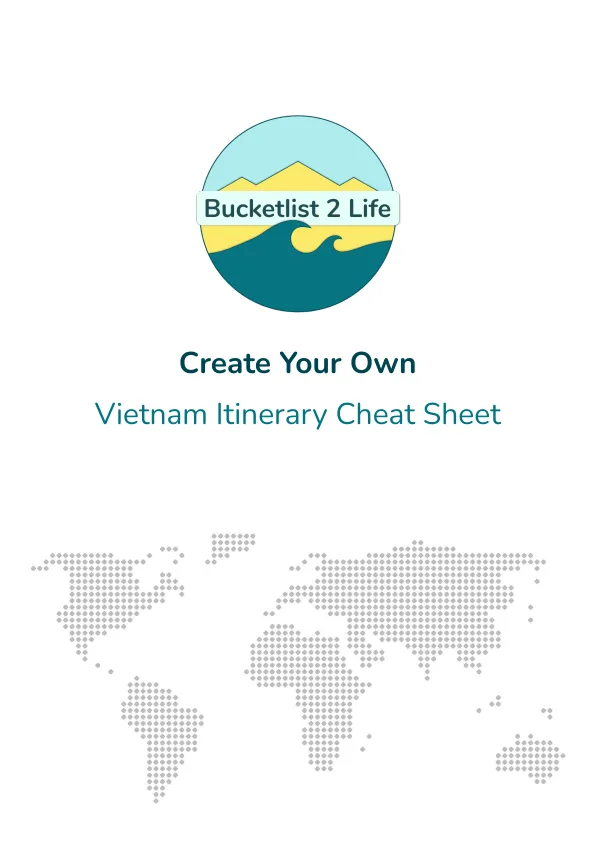
- Quick overview over the most important destinations in Vietnam.
- Decide which ones to visit and which ones to skip!
This post contains affiliate links. If you use these links to buy something we may earn a commission. You would help us a lot if you do so. Thanks. This post is not sponsored.



